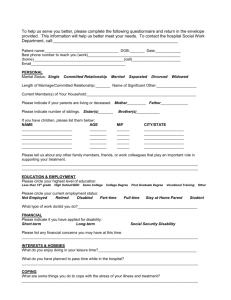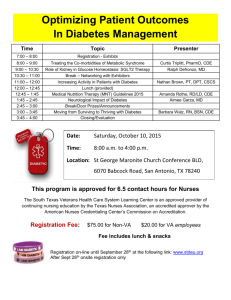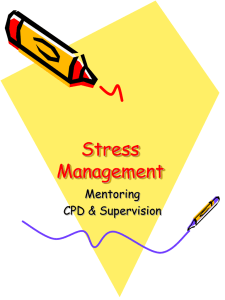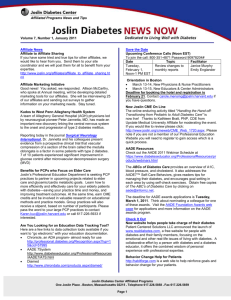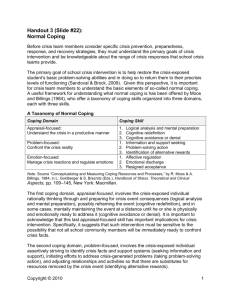CQI Patient Behavioral Goals
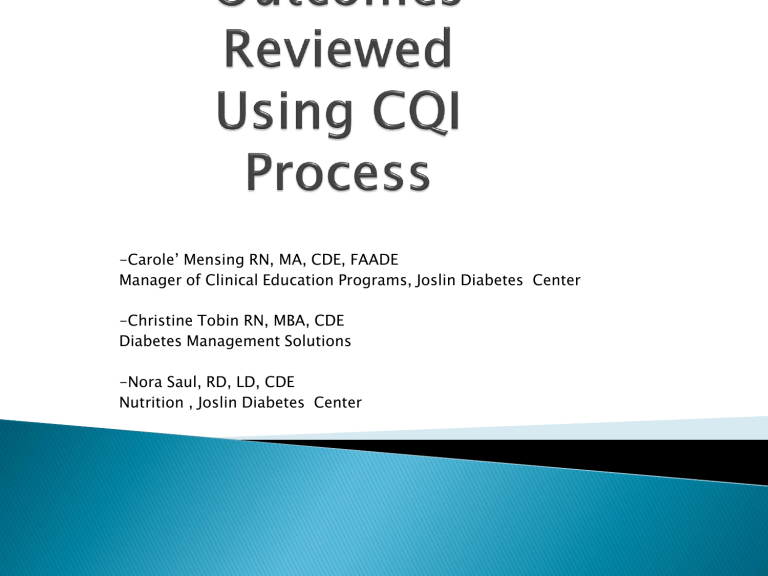
-Carole’ Mensing RN, MA, CDE, FAADE
Manager of Clinical Education Programs, Joslin Diabetes Center
-Christine Tobin RN, MBA, CDE
Diabetes Management Solutions
-Nora Saul, RD, LD, CDE
Nutrition , Joslin Diabetes Center
Review Documentation of Collaborative Goal
Setting- Identify Patterns, Trends
Assess the Current Goal setting and outcome
Measurement Practice
Identify Improvement Opportunities thru CQI
Hypothesis
◦ Process vs Outcome
Completed Comprehensive Program
Return for Follow Up
Five charts per Educator
Match pt for part 1 and 2, de-identify
Send/ mail Original, keep a copy
Ah Ah! Training Issue
Goal, objective
Behavioral plan/Action plan
Educational Plan/ Treatment Intervention
Behavioral Goal Setting/ Problem Solving
Behavioral Goal Change/ Change Sheet
Setting goals/ Collaborative Goal Setting
Comprehensive Program Completion
Simple Descriptive,
Process Design
Retrospective
Sample Design
Quality is more than conformity
Addresses root causes not symptoms
Improve the process to solve the problem!!!
AADE 7
Everything and Anything is part of a process
Remember 90% of the problems are the process, not the people.
Being Active
Healthy Eating
Taking Medication
Monitoring
Problem Solving
Reducing Risks
Healthy Coping
Patient / Client
SMART-Specific,
Measurable, Achievable,
Realistic, Timebound
Reviewed with each encounter – determine achieved, progress made, LTF, or revised.
Individualized
In God we trust…
In all others, bring data
# patients- 457
# goals- 1006
% LTF- 23
2009 (2008)
# patients- 417
# goals- 775 (1034)
% LTF- 22
2010 (2009)
Analyze
◦ Data Collection – audits part 1 and 2
◦ Goal Setting categories
◦ By site, using the Handout 2009 Site Specific
Achievement Data form.
Healthy Coping
Problem Solving
Taking Medication
Monitoring
Risk Reduction
Healthy Eating 35%
Physical Activity 21%
Physical
Monitoring 20%
Activity
Risk Reduction11%
Taking Medication
7%
Problem Solving 5%
Healthy Coping 2%
Eating Healthy
Breakdown by Achievement Level
5 (Always)
% Achieve 1
(Never)
2 (Rarely)
3
(Sometimes)
Always 35%
Usually 30%
Sometimes 22%
Rarely 8%
Never 5%
4 (Usually)
***********************
Big 3 67%
76% (increase)
Risk Reduction 1.3%
11% (increase)
*******************
Healthy Coping 3
Healthy Eating 21
Monitoring 18
Phys Activity 19
Prob Solving 5
Risk Reduction 19
Take Meds 7
All 92
2
4
2
19
3
3
3
2
40
21
29
21
100%
10
17
16
Healthy Coping 3
Healthy Eating 21
Monitoring 18
Phys Activitiy 19
Prob Solving 5
Risk Reduction 19
Take Meds 7
All Combined 92
Goal #
Category
3
20
16
15
5
19
5
83
# no
100
95
89
79
100
19
71
90
% no
Learn from the mistakes of others.
You won’t live long enough to make them all yourself.
Part 1-DSMS- what is this? (Criteria/ template)
Documentation better
PCP Communication at Follow up needs improvement (describe goal)
Part 2-Same goals for all pts
Several goals/ all 7 categories covered
Allowed only one goal
“Most goals not individualized”
HC- “Follow MP, check 1x daily and check feet”
HE- “Will eat 3 meals and 3 snacks a day”
M“Use electronic Glucose Log daily and review records weekly”
PA- “Exercise 20” daily once leg heals
PS- “Identify Potential problems”
RR-
“Follow MP, check 1x daily, check feet daily”
Med- “med with meals as physician ordered”
Next……………
Develop a Plan
Implement the Plan
Critical
Thinking
2.
3.
4.
6.
7.
8.
1.
5.
Identify the
Problem/Opportunity
Collect the Data
Analyze the Data
Identify Alternative
Solutions
Develop Implementation
Plan
Implement the Plan
Evaluate the Actions
Maintain the
Improvement
CQI : A Step by Step Guide for Quality
Improvement in Diabetes Education .
AADE (2008).
Improve our outcomes language
Clear understanding of the Education Process:
- Assess Plan Implement Evaluate Follow up
Establish Process - setting goals, measuring achievement- documentation- using the information for improvement!

